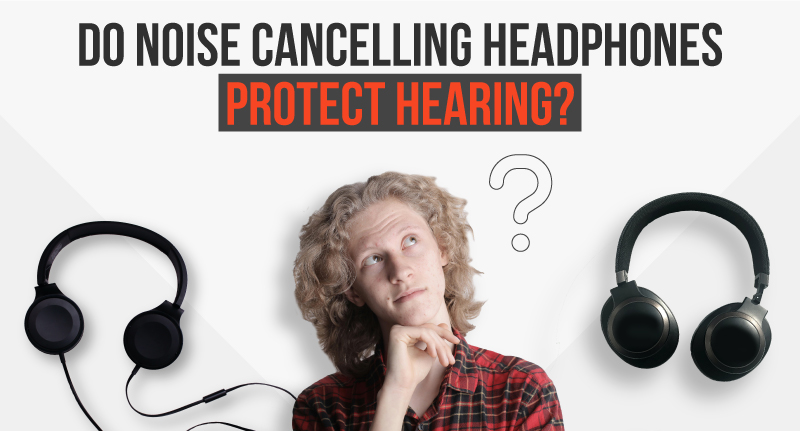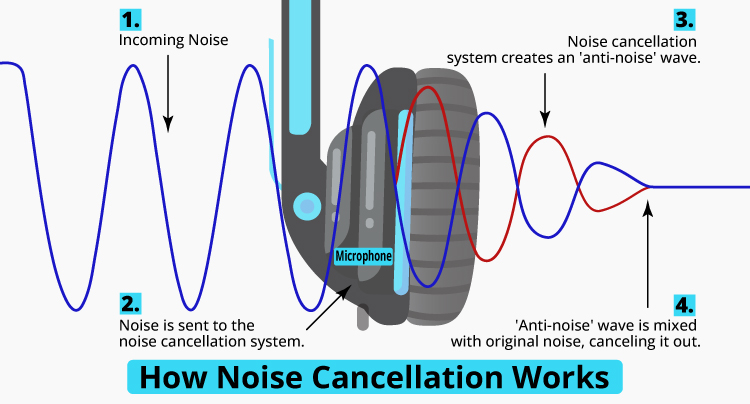
The world today is full of noise. Whether you are autistic, have sensitive hearing or just love peace and quiet, it can be really difficult to find environments where you feel comfortable.
This can impact your life quite badly. For those with autism, it means they cannot easily attend events due to the noise. Even a high school football game can overload their hearing. If you have sensitive hearing, a walk down the street can be painful. Roadworks, vehicle noise and more become difficult to cope with. If you want to sit quietly to read a book, even the park can have too much distracting noise these days.
We are all looking for an answer, so today I’m checking out what people really think of the latest technology and whether noise cancelling headphones protect hearing in the modern world.
What are Noise Cancelling Headphones?
The name describes headphones that can block out noise from the wearer’s surroundings. There are reasons why you might want to do this. It lets you hear your music, podcast and so on more clearly, for instance. The general idea of noise cancelling headphones has been around for a while, with two types available.
Passive Noise Cancelling Headphones
The first type on the market were passive noise cancelling headphones. These don’t use any electronics, making them cheap to buy and simple to use. They rely on a mechanical barrier to block out sound, with the earcup fitting tightly to your head, reducing the sound that comes from outside.
They do work to an extent, although because we all have different shaped heads, ears and so on, they are never a perfect fit. That means that some sounds from your environment always leak in to reach your ears. If you are listening to music, this may not be an issue, but if you just want all the outside sounds blocked out, they may not perform well enough.
Active Noise Cancelling Headphones
Here is where things get interesting. Developed by Bose for airline pilots, active noise cancelling is a fascinating technology built on amazing science. Headphones that use this technology actively cancel out sounds from around the wearer, and offer some major advantages over passive headphones.
Because they react to sounds around the wearer, even if you are not listening to anything, they can create a quiet listening environment. In addition, they react to the actual sounds around you, so as they become louder, the headphones respond. Passive systems can be overwhelmed by the volume, but here the system works harder as volume increases.
The science behind active noise cancelling

So, active noise cancelling headphones have a lot to offer, but how do they do it? To understand noise cancelling, first we must look at what sound actually is.
The sounds we hear are the product of waves. Each sound is the creation of a different wave, each vibrating at a different frequency. As we can see, a sound wave has peaks and troughs, with the distance between them and the size of them dictating the pitch and volume of the sound.
Active noise cancelling headphones have microphones on each earcup, positions to listen to the sound around the wearer. As it picks up this sound, it is transmitted to the electronic system, which then produces the perfect inverse of that sound. We call this destructive interference, but if you look at it as a wave, we will see something interesting. The peaks and troughs of this wave are directly opposite those of the soundwave coming in from around the wearer.
The noise cancelling system plays this through the headphone speakers, whether just on their own or alongside your music. What happens is that, because the peaks and troughs are the exact opposite of that outside sound, they cancel each other out. As a result, you hear nothing!
If you are listening to music, you will still hear that, but those exterior sounds are gone. If you just have the noise cancelling on, all you hear is silence.
Do noise cancelling headphones protect your hearing?
Yes, but also, it depends. Passive versions are good in some situations, with cost advantages and no need for batteries or electronics, you just put them on and you are done. However, they can be overwhelmed by very loud noise, and because they have to be designed to fit everyone, that seal is never quite perfect for anyone, so some sound can leak through. In areas where the noise is not overly loud, they can help, but cannot always be relied on.
Active noise cancelling is a little different. These systems respond to the noises around you, so they do a good job not just of blocking sounds, but of reacting to changes in sound and volume too. That makes them a great option for many people looking to protect hearing. Those with autism can use them in concerts, sporting events and so on, where the flexibility to allow some ambient noise in but block most is essential.
However, even here the system can be overwhelmed in some situations. You couldn’t use these types of headphones in a very loud industrial setting and avoid hearing damage for instance. There is one other issue to remember with active noise cancelling headphones too. There is a very tiny delay in how the sound is cancelled, and for a situation such as a firework display, a sudden loud noise can get through before being cancelled.
We asked users of active headphones how they found the experience, and one explained it like this:
The sound pressure level that enters your ear is being reduced, so yes, you are actually being subjected to less sound.
Nonetheless, they don’t reduce the sound enough to be used as actual hearing protection, say on a construction site.
Your ears only care what level of sound they are exposed to. Since with noise cancelling headphones on, the environment is quieter, they do protect your hearing.
There is one more thing to consider though, because they create a quiet environment, it can be easy to turn your own much up a little too loud when using them. So be careful with your noise cancelling headphones. They can offer protection in a lot of environments, but don’t forget that you need to keep your music volume down too.
How much do noise cancelling headphones reduce external noise?
While Bose developed the first active noise cancelling system, today there are hundreds of manufacturers with their own versions. They all use the same basic principles but differ in performance and usability. So, knowing how much reduction headphones gives is another of those ‘it depends’ type answers.
However, research has shown that among the main manufacturers, those reductions are somewhere between 20 and 40 decibels. The larger headphones that also include some sort of seal on the earcup to mechanically reduce sound perform the best, and the small, in ear options tend to offer the lowest reduction levels.
For passive headphones, the range is usually between 10 and 20 decibels, but again, this varies between manufacturers and models.
The best noise cancelling headphones available right now
There are many noise-canceling headphones available on the market. Here are some of the best options:
Sennheiser Momentum 4 Wireless
With large earcups, substantial padding and great noise reduction system, they have everything you need. Great battery life helps too, and whether you listen to rock, classical or the latest podcast, they always sound great.
Soundcore by Anker Life Q30
Most of the performance of the very best but with a much more affordable price, the Q30s are a great choice. With three modes, the noise reduction is incredibly flexible, making them a great option for daily use.
SONY WH-1000XM3
For those who love connectivity, these Sony masterpieces have class leading noise reduction and include seamless integration with both Alexa and Google Assistant. Extremely comfortable to wear, they also sound incredible.
Our Thoughts
Hearing protection is important, even walking down the street can expose us to harmful volume levels. For some, it can be the difference of enjoying an event or not attending at all, and for others, it can help manage their day.
Noise cancelling headphones have some limitations, but they can help with protecting your hearing. Passive systems have their place, but it is the active systems that offer the flexibility to be used daily and provide protection in most situations.
With noise cancelling headphones for autism and others who need protection, they can transform lives and protect hearing as well. We would always recommend active noise cancelling systems though, and don’t forget, for every day use, they make your music sound better too!




Leave a Reply